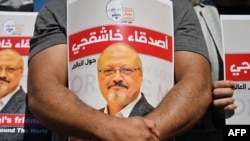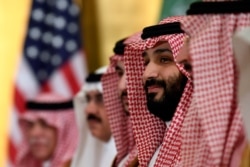On the day the U.S. declassified an intelligence report on the killing of Washington Post columnist Jamal Khashoggi, another prominent U.S.-based Saudi dissident received a death threat.
“You will have the same fate as Khashoggi,” read a comment in Arabic, posted as a reply to one of Abdullah Alaoudh’s tweets.
The Washington-based Middle East analyst and visiting adjunct professor at George Washington University, who frequently writes on Saudi Arabia, accuses the kingdom of being behind online threats that he says he receives “on a daily basis.”
He is not alone. Since Khashoggi’s death in the Saudi Consulate in Istanbul in 2018, multiple exiled activists have reported receiving credible threats to their lives from the kingdom or have been warned by Western governments of potential threats.
Agnes Callamard, the U.N. special rapporteur on extrajudicial killings who investigated Khashoggi’s death, told The Guardian on Tuesday that a senior Saudi official twice made threats against her during U.N. meetings.
Despite living in the United States, Alaoudh says he won’t feel entirely safe until the Saudi crown prince, Mohammed bin Salman, is sanctioned for his role in Khashoggi’s slaying.
The intelligence report released by the U.S. Office of the Director of National Intelligence last month concluded that the crown prince “approved an operation in Istanbul, Turkey to capture or kill Saudi journalist Jamal Khashoggi."
Saudi Arabia rejected the report, calling its findings “negative, false and unacceptable.”
"We think he will not stop,” Alaoudh told VOA via a messaging app, referring to the crown prince. “He thinks he can get away with [murder]. He was right."
The Saudi Embassy in Washington did not respond to VOA’s requests for comment.
For now, Alaoudh said, he takes precautionary measures, including a self-imposed travel ban, fearing he could become an easier target outside America.
The 37-year-old and Khashoggi were close friends who fled Saudi Arabia shortly after Salman succeeded his cousin to become the crown prince in 2017, assuming de facto control of the country’s domestic and foreign affairs.
They sought political asylum in the United States and often appeared as co-panelists, dissecting their country’s complicated politics for American audiences. Their views and criticisms were counter to the image Salman was trying to present of himself as a young, progressive leader, easing social restrictions such as the ban on driving by women.
‘Free pass’
The U.S. government has defended its decision not to sanction the crown prince, saying it does not typically blacklist leaders with which it has “diplomatic relations,” Jen Psaki, the White House press secretary, said in a TV interview.
Instead, the administration of President Joe Biden in February targeted more than 70 lower-ranking officials with economic sanctions and visa restrictions.
“It needs to be clear that our relationship with Saudi Arabia is one that is in the interest of the United States to maintain while still being clear that it will be recalibrated,” Psaki said.
Critics say the actions are not enough to deter Saudi Arabia from human rights abuses.
“This cannot be tolerated, and we must be calling for the right of the [Saudi] people to peacefully dissent and to participate in their governance,” said Bethany Alhaidari, co-founder of the Saudi American Justice Project, a Washington-based rights group.
Alaoudh is not the only exiled activist voicing concern. In January, Ahmed Abdullah al-Harbi, a Saudi dissident living in Canada, vanished after visiting the Saudi Embassy in Ottawa.
Al-Harbi, who helped another Canada-based Saudi produce a YouTube talk show called “Say It and Walk Away,” appeared weeks later in the kingdom, with a new Twitter feed in which the posts about Saudi Arabia and the crown prince were positive. Friends believe he may have been forced to return after visiting the embassy.
The circumstances around the repatriation of the 24-year-old remain unclear, but Saudis who work anonymously in Canada have said they fear al-Harbi could reveal their identities to authorities and put Saudi-based family members in danger, according to The Washington Post.
A separate incident took place a few months after Khashoggi’s killing. Iyad el-Baghdadi, a Palestinian human rights activist and critic of Salman who is based in Norway, learned from the country’s authorities of a possible Saudi threat against him.
"They gave [MBS] a free pass for the killing of Khashoggi,” said Michael Eisner, the general counsel and chief operating officer at the Democracy for the Arab World Now (DAWN), a Washington advocacy group that Khashoggi founded before his death. “That is not good news for exiled dissidents in other countries and Saudi dissidents.”
DAWN last week served the crown prince with a complaint filed in a D.C. District Court that alleges Salman and officials conspired to kidnap and assassinate Khashoggi.
Alaoudh still has family in Saudi Arabia. His father, Salman Alaoudh, and more than a dozen other family members have been jailed there since Salman assumed office. Salman Alaoudh was arrested over a 2017 tweet he posted to his 13 million followers, including a prayer for improved ties between his country and neighboring Qatar.
The 64-year-old could face the death penalty if convicted of his charges, which include terrorism and “inducing corruption.”
Alaoudh said he believed his activism in the U.S. was the reason authorities have been punishing his ailing father.
“They are interrogating my father in prison over what I tweet or what I say, but I will never stop because if I stop and cave in, they will just use it again and intimidate us more,” Alaoudh said.





